Climate change: What if your job is bad for the planet?
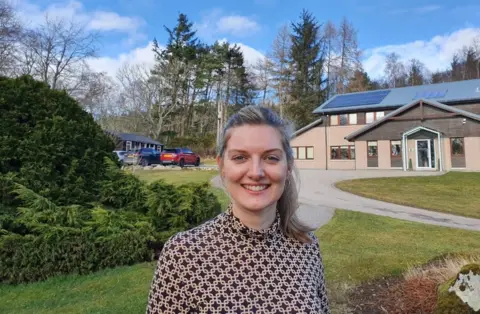 BBC
BBCWe know that climate change harms people but policies to tackle climate change can harm people too.
And typically it's the poorest who're most likely to suffer from lost jobs in dirty industries and higher energy bills.
In Scotland, for instance, they made thousands of workers jobless when the coal mines closed over the last 30 years. Now they're looking to wean themselves off oil and gas to protect the climate.
An expert group known as the Just Transition Commission has been touring the country hearing stories from people whose jobs aren't wanted in a clean tech world.
Rab's story
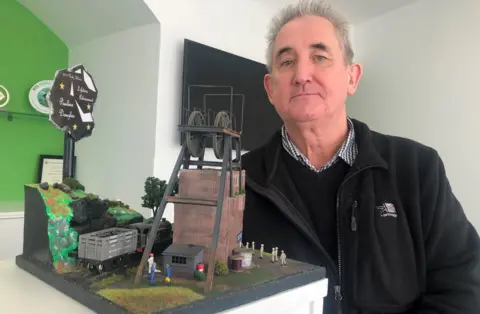
Rab McKenzie is a retired energy worker who lives near Kincardine in what used to be the Scottish coal belt.
His father helped him into the local mine when he left school. He then switched from one pit to another, before ending up at Longannet power station, where he hoped to work until retirement.
Some hope. Longannet closed when Rab was 56. “At my age I was struggling to get a job,” he told me. People didn't want you. You were on the scrapheap. It was not great - I’ve not had a job since.”
There’s little employment now for the children growing up in Kincardine. And the village itself – like Rab - is growing old.
Politicians round the world need to ensure Rab’s experience isn’t replicated thousands of times over as nations shift away from coal, oil and gas.
Tom’s story
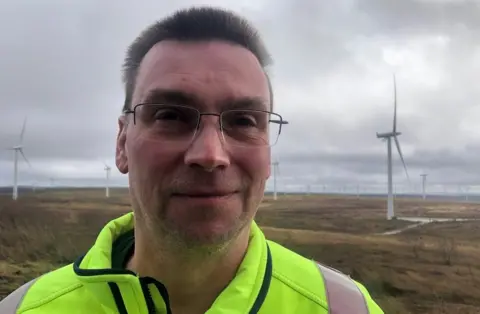
Tom Connell is an accidental poster boy for the principles of the just transition.
He joined Cockenzie power station near Edinburgh when he was 16, but it was soon shut down and he was laid off. “It was a shock,” he told me. “A terrible shock.”
He shifted to an apparently secure controller job at Longannet, but faced the dole again when that plant closed.
Tom was offered another job in energy - but at Whitelee wind farm near Glasgow, one-and-a-half hours from home. His pay would be cut by £2,000 a year.
He took it. Now Tom’s new office window surveys an array of slender turbines on tussocky moorland. It’s a relief, he says.
“Working in the coal it was always dirty – coal dust and oil,” he explains. “And there was no window in the control room so you would never see the daylight. I like it up here – you’ve actually got a window.”
But what about the pay cut or the relocation? “To me it was worth it for the job security,” he says.
But how do governments ensure that the move away from fossil fuels replicates Tom’s story, not Rab’s?
Charlotte’s story
Charlotte Hartley is a member of the Scottish Just Transition Commission, studying how cities like Aberdeen can prise themselves away from dependency on oil and gas.
I met her in Aberdeen Maritime Museum – a reminder that the city’s economy already made one huge transition away from fishing, a natural resource that has mostly disappeared.
She told me the clean industrial revolution is already underway. “Some oil and gas firms in Aberdeen and globally have re-branded,” she said.
“Their portfolio is significantly expanded, so I think there’s going to be no such thing as an oil and gas company – it’s going to be a far broader energy business.
“One company in Aberdeen will be working on a number of different departments – whether that is hydrogen, carbon capture; oil and gas production, wind - offshore and onshore. It’s going to look a lot more diverse, which is really good for the region."
Doesn’t she fear a boom-bust effect? “No. Aberdeen has a strong history of generating its own activity. From granite to fisheries, to oil and gas – it's a very industrious region and it’s got a lot of talented people who are recognising the change that's taking place – particularly in the climate conversation.”
Aberdeen does indeed enjoy much more economic diversity than the moribund coal fields. But is Charlotte wearing green-tinted spectacles?
The rig crews’ story
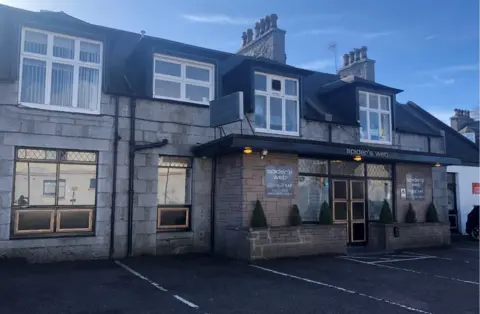
I checked the view of the rig crews in Spider’s Bar - close to Aberdeen’s North Sea helipad.
The patrons don’t want to be named or photographed – but some are happy to share their views about the future of oil and gas in Aberdeen.
I ask one if oil will still be thriving 30 years hence when he plans to retire. “Easy,” he says, “easy.”
Was he worried about the transition away from fossil fuels? “I don’t know much about it. We just turn up and take the money,” he said.
A colleague said he expected at least 15 years more oil and gas drilling. “That’ll see me through (to retirement)” he said. “This is my third oil slump and I’ve got through OK.”
They are an optimistic bunch - but there's no guarantee they'll all find suitable jobs if the oil and gas industry is forced to close sooner than they expect.
Pauline’s story
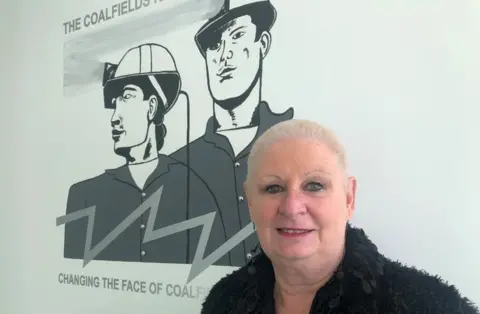
Meanwhile Pauline Douglas is working to bring life back to the villages near Longannet where Rab and Tom were laid off.
She was born in the area and she's working with colleagues in the Coalfields Regeneration Trust to revive the villages.
They have been wooing the Spanish firm Talgo, which is promising to build high-speed trains at Longannet – if it secures a major order such as HS2.
“There will be new houses, new businesses,” she says. "And I think most important of all is the children will have hope and aspirations for the future if there’s going to be real jobs in our communities," she says.
"They don't really have that hope just now.”
That, of course, is if the factory actually appears. But Pauline says one clear lesson from the coal fields is for the authorities to start looking to replace lost jobs as soon as possible - not waiting for years as they did when the pits were boarded up.
The chairman’s story
The chair of Scotland’s Just Transition Commission is Prof Jim Skea. At the request of the Scottish government, his commission has been touring the country hearing people’s views on the issue.
The sober foreword for their interim report notes: “Scotland stands at a critical point on its journey to a net-zero economy.
“While emissions have fallen by almost 47% since 1990, the next phase of Scotland’s fight against climate change will be harder and will have a much more visible impact on people’s day-today lives.
“This will bring significant opportunities, but also inevitably challenges which must be managed by the government.
“It is imperative that we ensure fairness and a just transition for all as we move into this next phase if we are to have any hope of ending our contribution to climate change.”
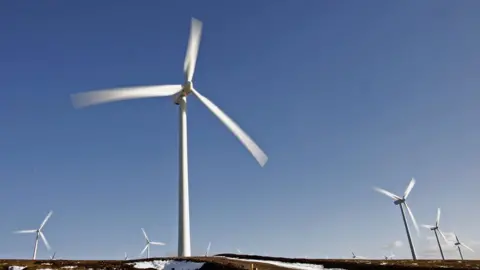 Getty Images
Getty ImagesThe report will be launched next week. It says urgent action is needed if Scotland is to meet its climate change targets - and that action will have to be fair to the poorest and to people in high-carbon jobs.
Poorer people should get help installing low-carbon heating such as heat pumps.
The Scottish government, it says, shouldn't make any policies or plan any infrastructure that will make it harder to cut emissions in the future.
And it should press ahead with plans for making buses a priority and for providing better services in rural areas.
The report insists that if Scottish farmers have to reduce numbers of cattle and sheep to cut methane emissions. People in the UK must eat less meat overall – or meat will be imported from areas where emissions are higher.
The next phase of the commission’s report will tackle the question of how this great transition can be funded.
The full interim report is launched next week.
Follow Roger on Twitter.
